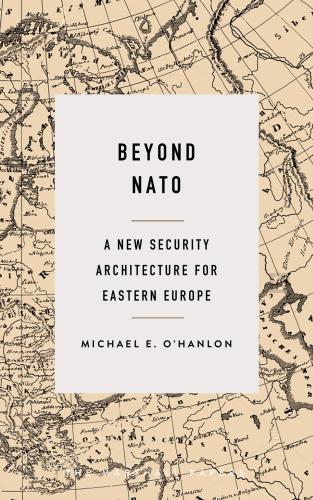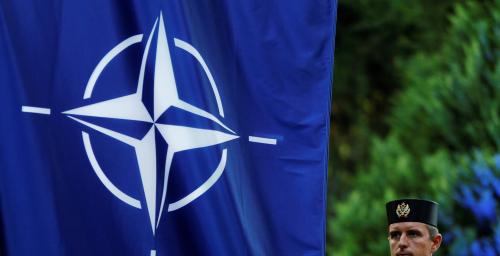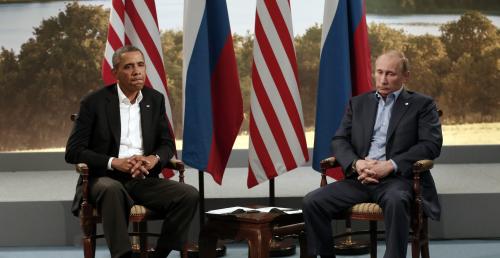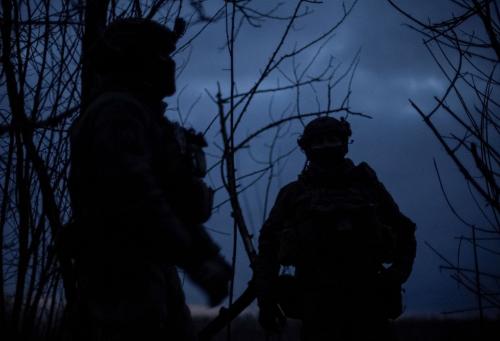There is one way in which, without compromising our values or sacrificing the interests of any of our allies and friends, we may be able to help ratchet down the risks of NATO-Russia war, writes Michael O’Hanlon. It begins by recognizing that NATO expansion, for all its past accomplishments, has gone far enough. This piece originally appeared on USA Today.
Despite his 2016 campaign’s sordid ties to Moscow, and despite his inappropriate infatuation with the strongman ways of Vladimir Putin, there is a kernel of wisdom in President Trump’s instincts about U.S.-Russia relations that most of the rest of us are being too quick to ignore or condemn.
Yes, U.S.-Russia relations are destined to be poor at least as long as Vladimir Putin is president of the Russian Federation—a job he is likely to keep through 2024. And yes, as Trump’s own national security team agrees, and as his new National Security Strategy reiterates, America and its allies need to recognize that we are in a protracted global geostrategic competition with Russia. However, the possibility of direct NATO-Russia war that could erupt, for example, if Putin decided to test our collective willingness to defend the Baltic states—formerly part of the Soviet Union, now NATO members and allies—is a potential threat to our very survival that we should be seeking ways to defuse.
There is one way in which, without compromising our values or sacrificing the interests of any of our allies and friends, we may be able to help ratchet down the risks of NATO-Russia war. It begins by recognizing that NATO expansion, for all its past accomplishments, has gone far enough. We should seek, if Putin will do his part, to create a new security architecture for eastern Europe that would explicitly rule out bringing countries like Ukraine and Georgia into the 29-member alliance. Putin would have to agree not only to solve territorial disputes with his neighbors and end his aggressions against them, but to acknowledge their rights to join other organizations including someday the European Union.
This concept would address the crisis in U.S.-Russia relations, and Trump’s own dilemma, by taking a page out of former president Eisenhower’s playbook: If you have an insoluble problem, enlarge it. We should consider a big idea—a new way to improve that part of the relationship that it may be within our power to do something about—while we otherwise continue to push back hard against every other element of aggressive Russian behavior around the world.
Why would an end to NATO expansion defuse tensions? We can’t be sure that it would, of course. But as Thucydides, the great historian from antiquity, taught us, people go to war for three reasons—out of fear, out of interest or greed, and to preserve honor. Russia has no good reason to fear NATO militarily, and it is probably not interested in controlling Ukraine, Georgia, Moldova, or other neutral states for their (generally meager) wealth. Many Russians have, however, felt that their honor has been insulted in various ways ever since the Cold War ended, and the expansion of the very alliance that defeated them in the Cold War 1,000 miles eastward, right up to their borders may be much of the reason. NATO’s stated goal of expanding further to include Ukraine, Georgia and other countries would exacerbate the perceived insult.
Some will say this arrangement would abandon Ukraine and Georgia and other states to a Russian sphere of influence. Nonsense. It is current policy that has effectively abandoned them. At its 2008 summit, NATO promised eventual membership to Ukraine and Georgia. But it did so without offering any specificity as to when they would get it, any roadmap for how to join, and any form of an interim security guarantee. Knowing of our eventual interest in bringing these nations into the alliance someday, Putin has also had every incentive to keep them weak and unstable to preclude their eligibility for membership.
This approach would be no “Yalta 2” because it would insist that the neutral nations of eastern Europe maintain every sovereign right to manage their own countries, economies, and foreign policies. We would simply choose not to extend a specific alliance that American GIs undergird any further eastward.
While NATO was conceived as an alliance that might expand, it only added four members to its original 12 throughout the entire Cold War. Moreover, Article X of NATO’s original Washington Treaty explicitly says that expansion should only occur if new members were “in a position to further the principles of this Treaty” and could “contribute to the security of the North Atlantic Area.” The possibility of expansion was never meant to be unconditional or universal. It is also worth noting that Ukraine and Georgia are fairly far from the North Atlantic—and also fairly far away for NATO military forces that might someday asked to help defend them if they indeed did join the alliance.
Under this approach, which would require the support of Ukraine and Georgia as well as other countries like Moldova, Russia would have to withdraw its troops from countries where they are not welcome and do so in a verifiable manner. After that occurred, existing sanctions would be lifted. The Crimea matter could be finessed in various ways, such as refusing to recognize Russian annexation but otherwise putting the matter to the side. The neutral countries would retain their right to participate in multilateral security operations on a scale comparable to what they have done in the past—even operations that might be led by NATO. The architecture could be done as a memorandum of understanding among affected parties; a formal treaty would be too cumbersome to create. If Russia ever violated its obligations under the understanding, all of its provisions would be invalidated.
There is no guarantee, of course, that Putin will prove interested in this idea. He may prefer, for reasons of domestic support and Russian aggrandizement, a contentious relationship with the West. All the more reason that, if we do propose it to him, it should be done without apology for previous rounds of NATO expansion. These policies did in fact help consolidate democracy and stability in much of central Europe. They were also done in close consultation with Moscow all along. The current dangerous state of poor NATO-Russia relations is Putin’s fault, not ours. But that does not mean we should simply keep all elements of current policy on autopilot. There are at least some new ideas within our power to propose and promote.







Commentary
President Trump might be on to something with Russia
December 20, 2017